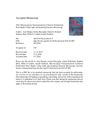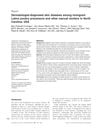 32 citations,
November 2018 in “Anais Brasileiros de Dermatologia”
32 citations,
November 2018 in “Anais Brasileiros de Dermatologia” In Brazil in 2018, the most common skin issues were acne, photoaging, and nonmelanoma skin cancer, with treatments often including topical medications and sunscreen.
 April 2019 in “The journal of investigative dermatology/Journal of investigative dermatology”
April 2019 in “The journal of investigative dermatology/Journal of investigative dermatology” Targeting cholesterol, fatty acids, fibrosis, and mast cells may help treat CCCA.
 April 2019 in “The journal of investigative dermatology/Journal of investigative dermatology”
April 2019 in “The journal of investigative dermatology/Journal of investigative dermatology” Keloids significantly reduce quality of life, and treating symptoms should be prioritized.
 11 citations,
September 2012 in “The journal of investigative dermatology/Journal of investigative dermatology”
11 citations,
September 2012 in “The journal of investigative dermatology/Journal of investigative dermatology” A mutation in the KRT71 gene causes a hair disorder by disrupting hair follicle structure and texture.
 21 citations,
April 2019 in “Clinical, cosmetic and investigational dermatology”
21 citations,
April 2019 in “Clinical, cosmetic and investigational dermatology” The document concludes that stopping shaving or removing affected hair can alleviate Pseudofolliculitis barbae (PFB).
 September 2020 in “bioRxiv (Cold Spring Harbor Laboratory)”
September 2020 in “bioRxiv (Cold Spring Harbor Laboratory)” Different fish use the same genes to regrow teeth.

The document concludes that the girl's hairlessness is likely inherited from her parents.
 87 citations,
May 2012 in “PLOS Genetics”
87 citations,
May 2012 in “PLOS Genetics” Six new genetic regions linked to early hair loss also connect to Parkinson's disease and prostate cancer, possibly leading to new treatments.
 29 citations,
January 2016 in “International Journal of Dermatology”
29 citations,
January 2016 in “International Journal of Dermatology” Longer hair loss leads to more severe CCCA; early treatment and avoiding damaging hairstyles help regrowth.
 2 citations,
March 2023 in “BMC ecology and evolution”
2 citations,
March 2023 in “BMC ecology and evolution” Some hair protein genes evolved early and were adapted for use in hair follicles.
 12 citations,
July 2016 in “Forensic science international”
12 citations,
July 2016 in “Forensic science international” The research found that postmortem root bands in hair are likely caused by the breakdown of a specific part of the hair's inner structure after death.
 7 citations,
April 2011 in “Expert review of dermatology”
7 citations,
April 2011 in “Expert review of dermatology” The document concludes that patients with skin of color need specialized dermatological care and education to manage unique skin conditions effectively.
 January 2010 in “Springer eBooks”
January 2010 in “Springer eBooks” Hirsutism can lower a woman's quality of life, causing emotional distress and affecting social and work opportunities.
 9 citations,
February 2022 in “Nature communications”
9 citations,
February 2022 in “Nature communications” Rare changes in the KRT82 gene are linked to a higher risk of Alopecia Areata.
7 citations,
February 2019 in “Veterinary medicine and science” An American Bully with a genetic skin condition improved significantly with specific topical treatments.
 288 citations,
June 2009 in “Human reproduction update”
288 citations,
June 2009 in “Human reproduction update” The modified Ferriman-Gallwey method is a useful tool for diagnosing hirsutism.
 19 citations,
June 2009 in “Seminars in cutaneous medicine and surgery”
19 citations,
June 2009 in “Seminars in cutaneous medicine and surgery” Proper education can prevent traction alopecia in women of color.
15 citations,
April 2016 in “Medicine” SLE patients with Evans syndrome often show blood issues and need careful monitoring and treatment.
 48 citations,
July 1996 in “Human & Experimental Toxicology”
48 citations,
July 1996 in “Human & Experimental Toxicology” Human enzymes can detoxify harmful substances but might also increase their cancer risk.
 May 2010 in “Journal of the Dermatology Nurses' Association”
May 2010 in “Journal of the Dermatology Nurses' Association” Cicatricial alopecia causes permanent hair loss and is treated to relieve symptoms and stop progression.
 49 citations,
August 2009 in “British Journal of Cancer”
49 citations,
August 2009 in “British Journal of Cancer” Finasteride might lower the risk of low-grade prostate cancer but not high-grade cancer, while alpha-blockers might reduce high-grade cancer risk.
 4 citations,
March 2018 in “PloS one”
4 citations,
March 2018 in “PloS one” Men with less sun-sensitive skin have lower PSA levels, while men with more sun-sensitive skin have higher PSA levels.
 20 citations,
June 2019 in “Experimental Dermatology”
20 citations,
June 2019 in “Experimental Dermatology” The research suggests that autophagy-related genes might play a role in causing alopecia areata.
 65 citations,
November 2016 in “Journal of The American Academy of Dermatology”
65 citations,
November 2016 in “Journal of The American Academy of Dermatology” The document concludes that early recognition and treatment of primary cicatricial alopecia is crucial to prevent permanent hair loss.
 9 citations,
July 2011 in “Scientific Reports”
9 citations,
July 2011 in “Scientific Reports” Changes in the HR gene have influenced hair growth and may lead to hair loss conditions in humans.
 1 citations,
January 2021 in “Journal of the Dermatology Nurses’ Association”
1 citations,
January 2021 in “Journal of the Dermatology Nurses’ Association” The convention discussed various skin conditions and treatments, and highlighted the importance of vaccinations for patients on immune-altering medications.
 43 citations,
December 2020 in “PLOS Genetics”
43 citations,
December 2020 in “PLOS Genetics” New method finds genetic links between Type 2 Diabetes and Prostate Cancer not seen before.
 40 citations,
June 2013 in “Journal of cosmetic dermatology”
40 citations,
June 2013 in “Journal of cosmetic dermatology” Brazilian keratin treatments can straighten hair but may contain harmful formaldehyde.
 16 citations,
March 2013 in “International Journal of Dermatology”
16 citations,
March 2013 in “International Journal of Dermatology” Immigrant Latino workers in North Carolina, especially in poultry processing, often have skin diseases like fungal infections and acne.
 2 citations,
January 2019 in “Skin appendage disorders”
2 citations,
January 2019 in “Skin appendage disorders” Higher social status is linked to earlier diagnosis and better treatment results for Frontal Fibrosing Alopecia in women.




























